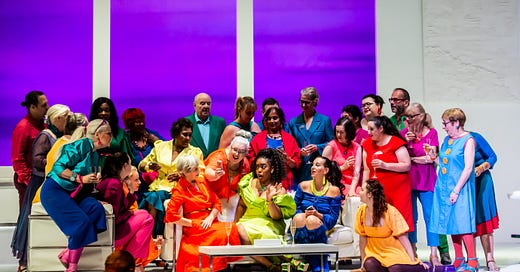Semele, centre (Francesca Chiejina) surrounded by the community chorus Picture by Lidia Crisafulli
Handel’s music drama Semele - conceived for performance ‘in the manner of an oratorio’ - has always been one of the composer’s most frequently staged works. It is proving popular in 2023, if the new community production by Blackheath Halls Opera (BHO), ambitiously following stagings at Glyndebourne and the Munich Opera Festival, is anything to go by. But BHO is nothing if not ambitious.
In recent years the company has tackled Mozart’s difficult opera seria Idomeneo, Weber’s hot-potato Singspiel Der Freischütz and Bernstein’s perennially problematic Candide (with huge success). English Handel is a harder nut to crack, but the spirit with which BHO imbues its Semele made the visit to Blackheath more than worthwhile. It goes without saying that a community company can’t be expected to match the polish of a professional company, let alone Glyndebourne, which has made a speciality of the composer’s works since the Orchestra of the Age of Enlightenment became one of its resident pit-bands. At Blackheath, Christopher Stark’s measured tempi - presumably geared to the abilities of amateur players and singers - might not be regarded as ‘historically informed’, but the evening never dragged, and there were many positives: the enthusiasm of the community performance, the excellent solo contributions of the professional cast, and a judiciously edited score that encapsulates the story of Semele within an audience-friendly time-span.
Keep reading with a 7-day free trial
Subscribe to Operalogue to keep reading this post and get 7 days of free access to the full post archives.




